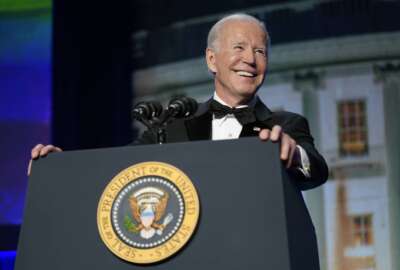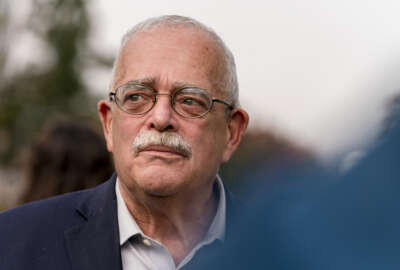Senior Executives Association’s outgoing president describes org’s changes
The Senior Executives Association hired Gregory Brooks to fill a new executive director role after the association's president for the past two years Bob Corsi...
Best listening experience is on Chrome, Firefox or Safari. Subscribe to Federal Drive’s daily audio interviews on Apple Podcasts or PodcastOne.
Some big changes are underway at the nonprofit group that represents the federal government’s career executives. The Senior Executives Association has hired Gregory Brooks to fill a new executive director role. Brooks and a new team of contractors will manage SEA’s day-to-day operations. Meanwhile, Bob Corsi, who served as the association’s president for the past two years is stepping down. Corsi joined Jared Serbu on the Federal Drive with Tom Temin to talk about some of those changes.
Interview transcript:
Jared Serbu: And Bob, I guess the right place to start here is talk to us first a little bit about why you decided it was time to hang up your hat as president of SEA. I know it was only supposed to be an interim role to begin with and two years later, here we are. But talk about the timing a little.
Bob Corsi: So I think I was asked about two years ago by the chairman of the board. The last president left and so there was a gap, the organization was having some significant challenges. And the chairman asked if I would be willing to come on board for three months to help navigate the association. So I said sure. Again, I really cared about the association. I’ve been part of it for over 20 years. And I said, I’m glad to do what I can to help. So that three months got extended four times, so I was the interim president for a year. And then I got with the board, and I said, Look, if you want me to be the president, I would gladly do that for another year, and see the organization stabilized and allow the organization to decide how it wanted to move forward, organization-wise. So that’s how I put in the two years. I have been a volunteer for the last two years, helping to get the organization on a better financial footing. I did that on a strictly volunteer basis. And I had an incredible staff to help me work through this. We have no employees, we all have contractor help. For SEA, we are a virtual organization. But we have incredible people that were very passionate about SEA. And it was it was great having them, working with them to stabilize the association to get us in a reasonable position.
Jared Serbu: Yeah, you want to say another word or two about what that actually means to be in a more stable place, what changes as the organization really made?
Bob Corsi: Well, what happened was back in 2016, the organization made a decision that we needed to digitize how we were doing business, and to get out of the paper side of the house. So they brought a contractor on board to digitize everything, and recreated the membership database, a lot of that did not go well and we lost some members, records were not complete. So there was a lot of turmoil at the time. So we were still trying to figure out what we didn’t know, what was supposed to happen in that transition. So getting membership records as current as possible. And it’s still a challenge. Okay, we had some financial issues, and we’re able to work through all of our financial issues, which are not uncommon if you are a member association. Most members associations are dealing with financial challenges. So that’s what I spent the majority of my two years on in terms of stabilizing the foundation of the association, and giving us a good launching pad, where bring in new management can hopefully take us to that next level.
And the decision was made that we would look for an executive director who was part of a management association. Somebody with significant experience in running associations. While we had great leaders in the past, none of us had association leadership experience. We all came from the executive side of the house where we didn’t run nonprofit associations. So not having that financial background hurt the association over time. So now with the new management model, with an executive director with over 40 years experience running in associations, and now a board of directors strapping on a larger role to fill some of those roles we had the president because of his SES background, was able to address, which the executive director is not able to address. So it’s now a shared leadership responsibility between the board and the executive director who will oversee the day-in and day-out operation.
Jared Serbu: Yeah and meanwhile, as I understand it, your current role of the president is going away essentially, and being spread out across those board members. What are some of the discrete functions that you think still need to be handled by those folks that have the SES background on the board?
Bob Corsi: They’re always going to be involved on the policy side, you’re always going to be involved on working with the Hill on certain issues where the Hill wants to talk to somebody with that SES foundation, the credibility in terms of what they bring from their background. And that’s difficult for an executive director to do that didn’t grow up in that SES system. But again, it’s going to be constant. There’s going to be mentoring that’s going to be involved that individuals are going to look to form SES’s. Okay, so it’s mentoring the next generation. It’s kind of the leadership side on the policy side. That’s where I see the board and the members and the Board of Directors playing a huge role in moving forward.
Jared Serbu: And I think your time leading SEA also coincided with the presidential administration transition, which is always an interesting time for all federal employees. But for an organization like yours, what does it mean to move from, I don’t want to get political here because we’re not a political organization and neither are you, but to transition from a government being led by an administration that’s less publicly supportive of federal employees than the one that is in office right now, how big of a difference does it make between those two sort of attitudes?
Bob Corsi: There are significant challenges. And it’s mainly in the career workforce that works through those challenges, because they’re there day in and day out. Political leadership changes over every 18 to 24 months on average. So it’s that career leader that’s out there pretty much is working all of those transitions. So if you go from an administration that doesn’t necessarily embrace public service to one that does, you have to make sure that both sides of the house are ready in transition. We spend a lot of time developing transition documents, not only to help career members as to what they can do to help them to transition, but we also provide that information to new incoming politicals to try to educate them on what the career civil servant, especially the executive brings to the table, and to make sure that they try to listen to those individuals. Okay, but again, we emphasize on the career side, we are there strictly to follow the policy of the new administration. So again, they’re torn many times, but we’ve tried to prepare both sides to have a successful transition.
Jared Serbu: One of the changes that matters to your organization, obviously, is the Presidential Rank Awards are back. You and I are recording on a day when the president himself has just presided over the recognition ceremony. Talk a bit about what that means to have the president personally involved in something like that.
Bob Corsi: I think it was incredible to have the president do that, because it’s been almost 20 years, since we’ve had a president publicly recognize the accomplishments of the senior executives with the Presidential Rank Award. It’s the president’s award, it’s the highest award possible to a career SES in recognizing both distinguished side and the meritorious side. With the distinguished side recognizes the top 1% of the SES’s, and the meritorious recognizes the top 5%. It’s an incredible honor to receive one of those awards. And I have been honored to sit on the panel that looks at all of these write ups from the organizations on the accomplishments of these individuals. And it’s a very humbling experience, to be able to look at what these individuals are doing day in and day out, and the billions that they are saving the government. And it was a shame that you couldn’t publicly recognize these individuals before. And now the president has done it, virtually, understanding the COVID dynamics, and my hope is in the future, that we can do this in person where the president can shake their hands and recognize them and bring them to Washington.
Jared Serbu: Last thing before we let you go, Bob, you talked earlier about how you feel like SEA is in a better place now. Talk about what you think the challenge is, the biggest challenge is this new executive director and the board is going to have going forward whether that applies to the organization itself or the Senior Executive Service more broadly.
Bob Corsi: I think it’s more, public service has some challenges moving forward. We are clearly losing the talent battle, in terms of being able to attract the younger generation and we’re able to attract them, we’re not able to keep them. A lot has to do with dealing with a 100-year old-pay system that was started in the early 20s. We’re still using that today, in terms of pay compensation to individuals. Totally inadequate, we can’t compete with the private sector. But yet you have these young, talented individual individuals that want to be a part of the public service. And they feel it’s important to be able to give up their time. But at the same time, they’re expecting to be challenged, they’re expecting to be offered opportunities for growth. And that’s very difficult in an environment that you have right now when you don’t have budget predictability.
You also have, at the same time you’ve got Schedule F. But that came out in the last administration, where essentially you would take career servants that were leaders on the policy side of the house and make them at-will employees. They basically take away their career status. So a political individual coming in, that’s only in a very short period of time, can give an individual two weeks notice and you’re gone, when that cadre of individuals are the core to keep things going during transition. So while we continue to have things like Schedule F, which will still percolate, over time, you still see a rising, raising its head again, even though this administration killed it. There’s still interest in in bringing it back, because there’s not a trust in the federal civilian workforce. They’re looking for more accountability. And in my, I had 46 years in federal service, 28 years in the military, 18 years I was honored to be in the Senior Executive Service. Even on my military side, my civilians that I dependent on day in and day out, where the military transitioned every two or three years, they were incredibly important for the foundation and keep an organization going.
So my fear, looking out to the future, that the association is going to have to get the membership energized and get the Hill energized, that they’re going to embrace the things that are needed, where we can not only recruit but retain those talented individuals, young individuals that are out there, because we’re going to be losing a lot of that aging workforce. And on the younger side of the house, we are significantly short in that foundation to build on the leadership side. And we have challenges building our middle leaders, our mid-level leaders, because they don’t have the training dollars. Anytime you have a budget reduction, travel and training are the first things that get reduced. And mostly everything that’s happened, COVID, you name it, all the pressure is on middle managers to execute the policies. They are the face of the organization. So they’re under tremendous pressure, day in and day out. And my fear is that we’re not going to be able to retain him, they’re going to say enough is enough. And we’re going to have some major challenges. But we’ve got to get the Hill energized, and stop bad mouthing the public servants. We have 2.1, 2.2 million career civil servants, and we need to embrace them as very, very important to keep this country going. Look what happened when we furloughed them for weeks at a time and basically shut the doors and then the public realized what those folks did day in and day out to support them? So as we move forward, that’s my biggest concern.
On the association side, sure, we’re going to have challenges just like other member associations, but at least where we’ve got a stable platform, we got a great contract on board, we’ve got a great board of directors that’s heavily engaged. So I am very, I am cautiously optimistic as we move forward, that we’re going to be in a better place. But again, there are a lot of dynamics right now out there that are going to put pressure on the system.
Copyright © 2025 Federal News Network. All rights reserved. This website is not intended for users located within the European Economic Area.
Tom Temin is host of the Federal Drive and has been providing insight on federal technology and management issues for more than 30 years.
Follow @tteminWFED






